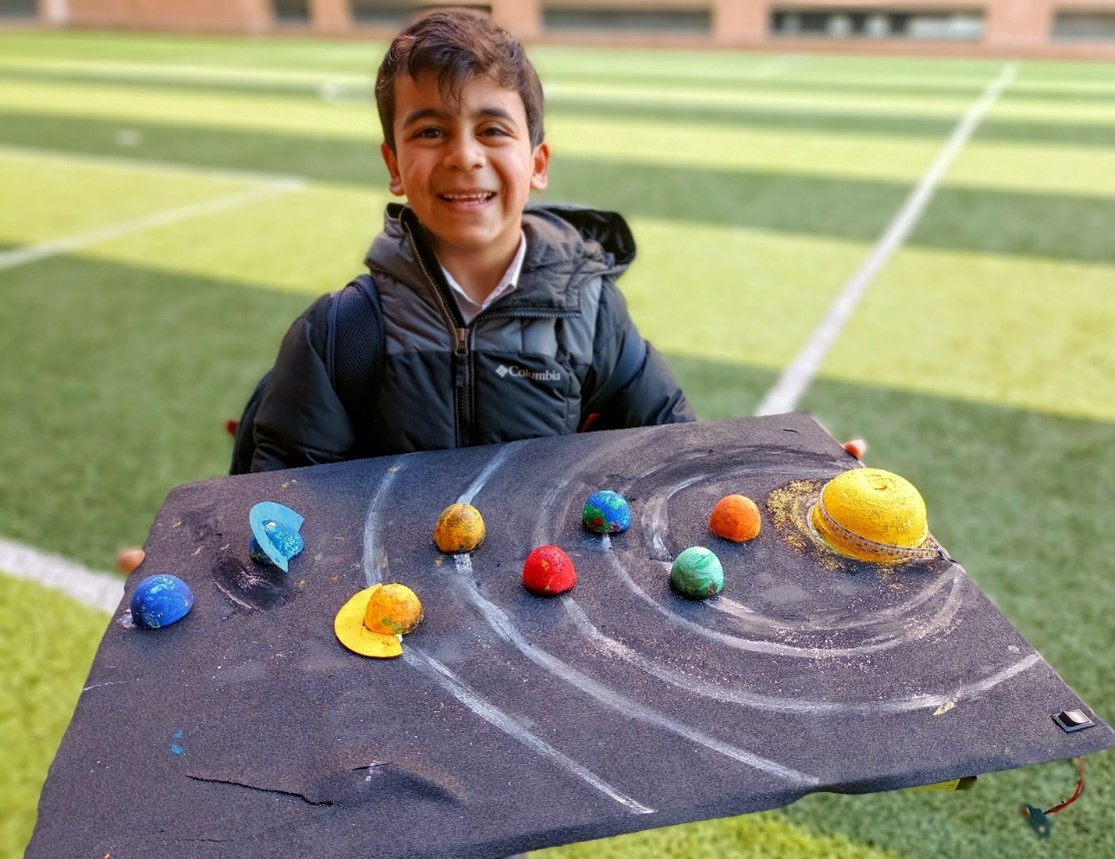THE ACADEMIC DEPARTMENTS
Curriculum Overview
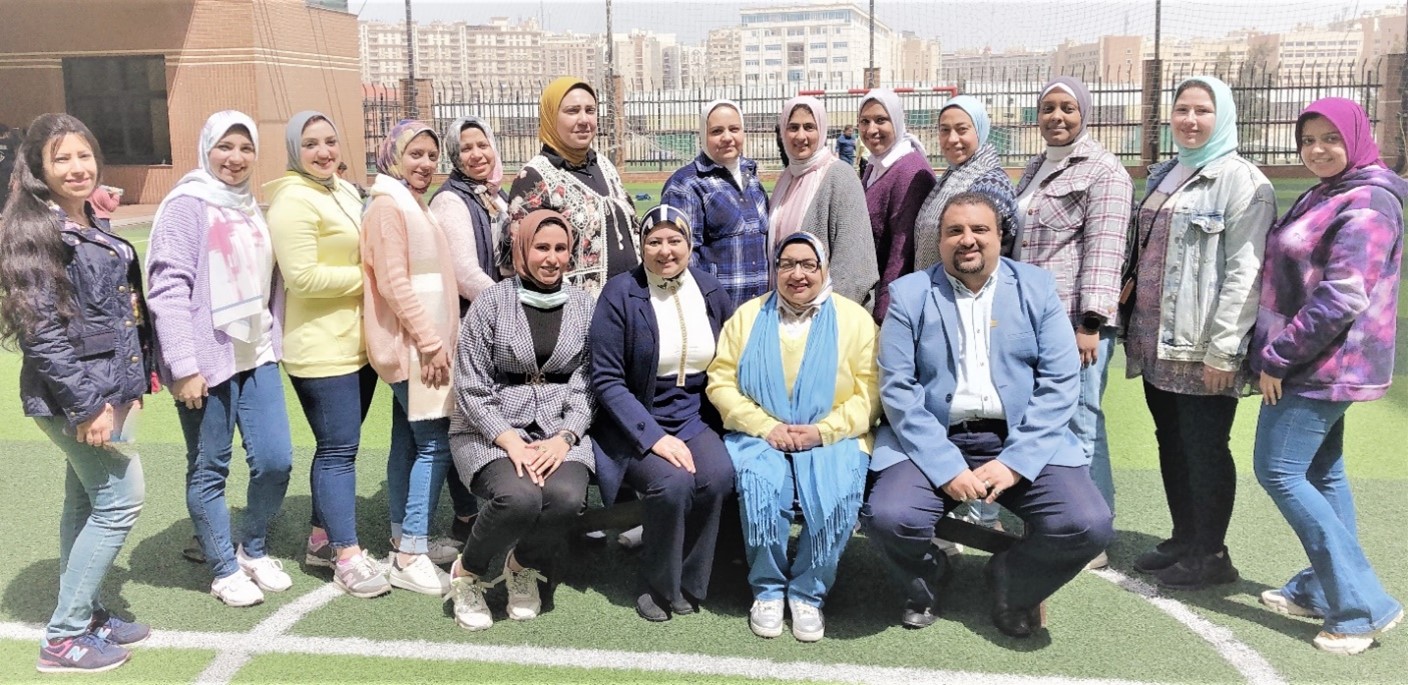
Dept. members
(right to left seated) Mr. Sameh Gaber / Ms. Sarah Abdel Aziz (HOD) / Ms. Youmna Ismail (HOD) / Ms. Aya Nasser
(left to right standing) Ms. Passant Seif / Ms. Tasneem Mostafa / Ms. Nourhan Ibrahim / Ms. Nihal Ibrahim / Ms. Doaa Okasha / Ms. Samar Shehata / Ms. Mayssa Ali / Ms. Rasha Galal / Ms. Mona Mohamed / Ms. Heba Fathy / Ms. Sarah Ramadan / Ms. Dareen Khamis / Ms. Mai Mostafa / Ms. Amani Abdel Fattah
Foundation
Topics studied
- زيادة الحصيلة اللغوية للطفل
- التعرف علي حروف اللغة العربية قراءة وكتابة
- تهيئة الطفل للتعامل والتفاعل مع المجتمع
- أن يتدرب الطالب علي القراءة الصحيحة والنطق السليم.
- التعرف علي أساسيات الإملاء وما يمكنه من الكتابة بشكل صحيح.
- أن يحسن التعبير عن نفسه في مختلف المواقف.
- تنمية عواطف الإيثار والخير والتعاون لدي الطلاب.
Lower Primary
Topics studied
- حروف اللغة العربية
- الأصوات القصيرة والطويلة
- مد ألف / واو / ي
- أسماء الأشارة (هذا – هذه)
- ضمائر المتكلم (أنا – نحن)
- ضمائر الغائب (هو – هي)
- التاء المربوطة
- الشدة
- اللام الشمسية
- التنوين بالفتح / بالكسر/ بالضم
- المفرد والجمع
- الفعل الماضي والمضارع
- ضمير المخاطب
- حروف العطف والجر
- أسلوب الأستفهام
- أسماء الإشارة للبعيد
- أسلوب النهي / النفي / النداء
- أقسام الكلمة
- الأسماء الموصولة
- المثني
- المؤنث والمذكر
- أسلوب الاستفهام
- ياء الملكية
- أنواع الفعل
- أسلوب التعجب / الأمر
- جمع المذكر السالم والمؤنث السالم
- جذر الكلمة وعائلة الكلمة
- ضمائر المخاطب
- أنواع الجموع
- الجملة الاسمية والفععلية
- لام التعليل
- الظرف
- تعبير
- نصوص
- تحليل الكلمات
- قصص وأناشيد
Upper Primary
Topics studied
- أقسام الكلمة
- الضمائر
- أسماء الإشارة
- المثني
- أنواع الجمع
- الجملة الإسمية والفعلية
- إعراب المبتدأ والخبر (مفرد-مثني-جمع)
- إعراب الفاعل (مفرد-مثني-جمع)
- مطابقة الفعل للفاعل
- تحويل الجملة من اسمية لفعلية والعكس
- حروف الجر
- شبه الجملة
- (الجار والمجرور – الظرف)
- قصص ونصوص
- التعبير
- إعراب جمع التكسير
- إعراب جمع المذكر سالم والمؤنث
- علامات إعراب الفاعل والمفعول به
- إعراب المفعول لأجله والمفعول المطلق
- إعراب المضاف إليه
- نصوص قرأنية وشعرية
- أنواع الخبر
- كان وأخوتها وأنواع خبر كان وأخوتها
- إن وأخوتها وأنواع خبر إن وأخوتها
- الأسماء الخمسة وإعرابها
- إعراب الفعل المضارع (الرفع-النصب-الجزم)
- الأفعال الخمسة وإعرابها
- النكرة والمعرفة
- النعت والحال
Resources
كتب وزارة التربية والتعليم / كتب خارجية مثل: سلاح التلميذ و الأضواء
Enrichment Opportunities & Events
احتفال المولد النبوي / احتفال اليوم العالمي للغة العربية / مسرحية بمناسبة رأس السنة الهجرية / بيت وشاعر

Curriculum Overview
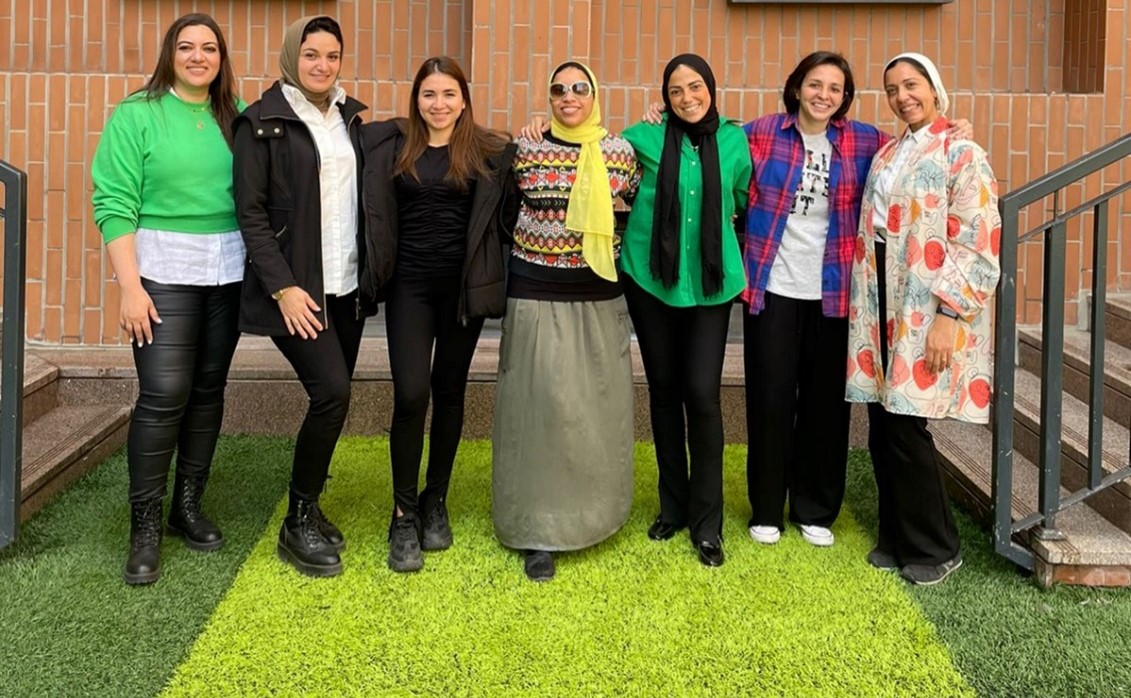
Dept. members
(right to left) Ms. Dalia Ashour / Ms. Nermine Magdy / Ms. Amira El Wakeel / Ms. Heba Fawzy / Ms. Dina Mwafy / Ms. Nouran Gamal / Ms. Fatma Mokhtar (HOD)Foundation Stage
Topics studied:
- Using various materials like crayons, paint, coloured pencils, markers & play dough to create art work.
- Explore a variety of art processes: painting, drawing, moulding, printing to create art work.
Lower Primary
Topics studied:
- Dot (Boosting creativity & courage)
- Autumn projects (how to draw a leaf pattern)
- Water colour spring flowers
- Buildings & shapes
- Abstract face
- Hot & cool colors (Happy sunrays)
- Lines & shapes
- Perspective landscape
- Winter landscape
- Create your own beautiful pressed flowers that will last a life time (Mother’s day craft)
- Animals & patterns
- Line art project (leaves)
- Hanging bat craft
- Line & shape (Polar Bear in snow)
- Imagine your own city & draw it
- Create your own still nature (Mother’s day craft)
- Draw your monster
- Color mixing
- Christmas craft (Snow man)
- Halloween Craft
- Differentiate between sharp edges & curved edges
- Halloween (Face details & tracing)
- Healthy connection with kids (Halloween craft)
- Changing drawing with different touches
- Winter patterns & curved lines
- Christmas craft (snow man)
- Perspective buildings
- Crazy hair day!
Upper Primary
Topics studied
- Highlights & shapes
- Tints & shades
- Complementary colors
- Warm & cool colors
- Using colors to express a mood or environment in a painting
- Landscape / collage / Decoupage
- Paint & print
- 3D building perspective
- Elements of design
- Spring flowers & patterns
- Trees & nature
- Artistic processes (Create-present-respond-connect)
- Elements of design
- Lines, shapes, forms
- Texture & colors
- Visual art
- Different cultures
- Design & fashion
- Abstract art
- Blending colours
- Nature & patterns
- Animating Characters to move around
- Cut & form (Autumn leaves)
- Difference between 2D & 3D form
- Geometric, organic shapes
- Drawing from observation
- Print making
- Design
- Color theory
- Egyptian art
- Doodling art & patterns
- Art around the world
- Stencil printing
Lower Secondary
Topics studied
- Abstract tree
- Fall leaves using different colors
- Halloween group work
- Positive & negative drawings (Black & white)
- Winter landscape
- Abstract art (portraits using straight lines)
- Landscape in an abstract way using different types of line
- Spring drawings
- Hot & cold colours sky line
- One-point perspective
- Fall leaves landscape
- Halloween Landscape
- Mosaic paper art
- Winter scenes drawing
- Abstract art portraits (using curved lines)
- Spring drawings
- Copper curving
Resources
We follow the Cambridge curriculum and, as such, ensure that we have all the necessary art materials to develop our student’s potential to its fullest.
We have three dedicated art rooms, with lots of natural light and space and we also enjoy the indoor and outdoor spaces offered by our premises to sketch and paint outdoors as well as create work based on the architecture and geometry of our building.Enrichment Opportunities & Events
Regular art exhibitions allow for our students work to be showcased and we also post examples of work regularly online.
Our DIY club is very popular as are many of the crafting and fashion design opportunities we offer.
Curriculum Overview
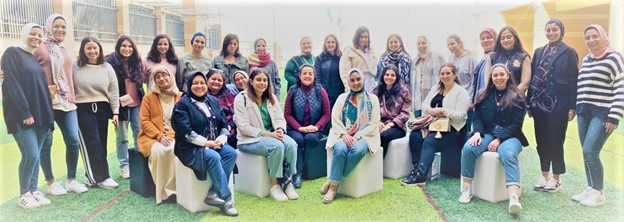
Dept. members
(right to left seated) Ms. Salma Helal/Ms. Nadine Mourad/Ms. Soaad ElShazly/Ms. Sarah Mantawy/Ms. Daina AbdAllah (HOD)/Ms. Passant Seliem/Ms. Rasha AbdAal (HOD)/Ms. Noha Salama (HOD)/Ms. Dina Nabil
(left to right standing) Ms. Toka ElAkhrass/Ms. Yasmine Meselhy /Ms. Shadwa Mongy/Ms. Sally Hafez/Ms. Layla Amr/Ms. Rasha Shatila/Ms. Noura Rashid/Ms. Maha ElMessiery/Ms. Lobna ElRayess/Ms. Alia Nouem/Ms. Yasmine Daboos/Ms. Nermeen ElNahriry/Ms. Rasha Meselhy/Ms. Reem Helmi /Ms. Rodaina/Ms. Haya Ramadan/Ms. Rana Sameh/Ms. Sherine El Habak/Ms. Basma El Shenawy/Ms. Farah Sherief/Ms. Malak KhaledFoundation Stage
Topics studied
- Recognising the sounds & names of the alphabet
- Using phonics to decode & read decodable/tricky words & sentences
- Exercising control to correctly form letters/ words & later sentences.
- Understanding the direction of print & starting to read simple texts in readers.
- Demonstrate understanding by answering simple questions about stories.
Lower Primary
Topics studied
- Stories with repetitive language
- Recounts of personal experiences
- Traditional rhymes
- How to make instructions
- Simple rhyming poems
- Traditional tales
- Poems on similar themes
- Stories with familiar settings
- Information texts
- Personal information
- Traditional tales from different cultures
- Poems with patterns in sounds
- Stories with familiar themes
- Poems with patterns in structure
- Explanations
- Poems to perform
- Stories by well-known writers
- Reports about a subject
- Different stories by the same writer
- Formal & informal letters
- Poems from different cultures
- Information texts
- Myths & legends: narratives
- Myths & legends: play scripts
- Poems with different structure
- Adventures stories
- Instructions
Upper Primary
Topics studied
- Dictionary skills
- Sentences openers
- Difference between statements, commands, questions & exclamations
- Variety of connectives
- Main & subordinate clauses
- Story with dilemma & Fantasy stories
- Poetry & kinds of poems
- Present tense, present simple, past simple & future simple
- Parts of speech, types of adverbs, IF as a possibility
- Verbs, nouns, adjectives & prepositions
- Facts & opinions
- Punctuation of direct speech
- Changing adjectives to adverbs in sentences
- Historical fiction
- Difference between formal & informal texts
- Active & passive
- Implicit & explicit
- Graphic organizer
- Comparative & Superlative
- Play scripts
- Expanded nouns phrases
- Quantifiers (either, neither, both)
- Adverbial phrases
- Dictionary skills
- Stories from different cultures
- Explanation text
- Non chronological report
- Poetry (narrative poems)
- Introduce all types of commas
- Parts of speech
- Irregular verbs
- Types of sentences
- Write impersonal recount & biography
- Finish poetry
- Classic children literature
- Introduce different types of planning
- Reported speech
- Idioms & idiomatic phrases
- Play scripts
- Persuasive
- Comparatives & superlatives
- Syllables (mono & poly)
- Modal verbs
- Countable & uncountable nouns
- Different kinds of adverbs & adverbial phrases
Lower Secondary
Topics studied
- Genres & sub genres
- Figurative Language
- Simile & metaphor
- Main ideas & summary
- Fact or opinion
- Context clues
- Characterization
- Comparative & superlative adjectives
- Planning descriptive writing
- Matching descriptive language to speech context
- Explaining how writers present & organize texts for effects
- Identifying relevant information & distinguishing between fact & opinion
- Dictionary skills
- Fact & opinion
- Passive voice
- Classifying purpose & audience in nonfiction texts
- Enhancing parts of speech in context (nouns, verbs, adjectives and adverbs)
- Past perfect
- Transition words usage & purpose
- Different aims of writing (inform, persuade, instruct, describe, explain, entertain)
- Informal e-mail (narrative & descriptive)
- Descriptive writing (people, places, objects & festivals)
- Clauses of: reason, result, contrast
- Note-taking exercises (past paper & developing summary & note-taking)
- For & against article
IGCSE & A LEVEL
Topics studied
- Theme 1: Identity & culture
- Theme 2: Local, national, international & global areas of interest
- Theme 3: Current & future study & employment
- Reading: Understand & respond to written language
- Writing: Communicate in writing
- Listening: Understand & respond to spoken language
- Speaking: communicate & interact in speech
Resources
We are well provided for with the most current textbooks and books from UK publishers such as Scholastic / Collins / Hodder / Oxford.
We also enjoy the use of the school library and the support of the librarian in ensuring that our students have access to appropriate and challenging Uk curriculum fiction and non-fiction.Enrichment Opportunities & Events
Events:
Our Spelling Bee is a hotly contested yearly event that involves all students; clips can be seen below:
We also take part in the Raz Kids reading challenges where our students always perform very well.
Drama performances, albeit somewhat affected by Covid restrictions, are a regular part of our school life and our Drama Club is a very popular and active extra-curricular activity across all year groups!
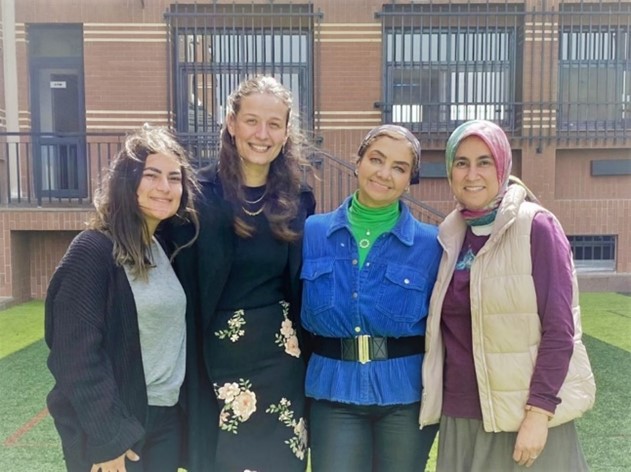
Dept. members
(right to left) Ms. Rania Abdel Ghaffar / Ms. Dina El Zarka (HOD) / Ms. Injy Abdel Moteleb /Ms. Ayten/Ms. Dina Mohamed/Ms. RokayaCurriculum Overview
Lower Primary
Topics studied
- Greet & say goodbye to someone
- Ask someone’s name and give your own
- Ask how someone is and respond to the same question
- Count numbers up to 10
- Identify classroom objects
- Identify colours & describe an object’s colour
- Say your age
- Recognise & repeat classroom instructions
- Identify parts of the body
- Recognise days of the week
- Recognise & use numbers (11-20)
- Talking about school objects
- Saying & understanding the alphabet
- Recognise & spell with letters of the alphabet
- Identify family members
- Recognise & ask for snacks
- Give basic opinions about food
- Recognise & use the months
- Talk about activities at a party
- Describe items of clothing
- Gender
- The indefinite article (un/une)
- Counting up to 20
- Verbe avoir (j’ai – tu as)
- Verbe avoir ‘to give’ + ages
- Saying when your birthday is
- The définit article (le/la/les)
- Regular plurals
- Expressing possession (‘s) by using (de)
- Silent (s) on the end of words
- Position of adjectives
- Agreement of adjectives, including blanc et marron
Upper Primary
Topics studied
- Talking about brothers & sisters
- Recognising statements in the negative
- Multi-cultural names
- Talking about your family
- Gender & plural
- Talking about your pets
- Some plural forms
- Describing yourself & others
- Verbs present & past
- Qualifying adjectives using “tres-assez”
- Adjective agreements (féminin, masculin, singulier, pluriel)
- Verbs (etre & avoir)
- Talking about hair & eyes
- Adjective agreements
- Talking about where people live
- Saying which kind of town you live in
- Saying where it is
- Adapting sentences
- Verbs
- Saying what kind of house, you live in
- Naming the rooms in a house
- Saying what there is on each floor
- Describing your bedroom
- Saying where things are
- Identifying & using prepositions
- Talking about what you do at home
- Identifying & using verbs
- Telling the time
- Counting up to 69
- Talking about likes & dislikes
- Using regular (-er verbs)
- Connectives
- Questions using intonation
- Talking about your survival kit
- Using the verb avoir
- Describing your self
- Understanding adjectives agreement (singular & plural)
- Talking about other people
- Expressing ideas (writing)
- Personal details about friends
- Describing a musician
- Using the present tense
- Expressing ideas
- Agreeing & disagreeing
Lower Secondary
Topics studied
- Using regular -er verbs
- Using jouer à
- Using the verb faire
- Using aimer + the infinitive
- Using ils and elles
- Using il y a / il n’y a pas
- use tu and vous
- Using à + the definite article
- Using je veux + infinitive
- Using on peut + infinitive
- Using nous to say we
- Using reflexive verbs (singular)
- Using higher numbers
- Using the near future tense
- Using je voudrais + infinitive
- Using subject pronouns: je, tu, il, elle
- Using j’aime, j’adore and je déteste
- Using un, une and le, la, les
- Using the verb faire
- Using on
- Using on peut + infinitive
- Using j’aime + infinitive
- Using question words
- Using the perfect tense of visiter
- Using the perfect tense of -er verbs
- Using j’habite and je voudrais habiter
- Using prepositions
- Using du, de la, de l’, des
- Using il faut + infinitive
- More practice with the near future
- Using the near future
- Using on peut
- More practice with the common irregular verbs
- Asking questions
- Using masculine and feminine nouns
- Asking questions using question words
- Using je voudrais + infinitive
- Using reflexive verbs
- Using perfect tense verbs
- More practice with the perfect tense
- Using j’ai le droit + infinitive
- Using mon, ma, mes
- Using three tenses together
- Using infinitives to mean –ing
Resources
Studio / Expo / Rigolo textbooks as well as access to IT labs where and when required
Enrichment Opportunities & Events
French picnic
Maze Runner event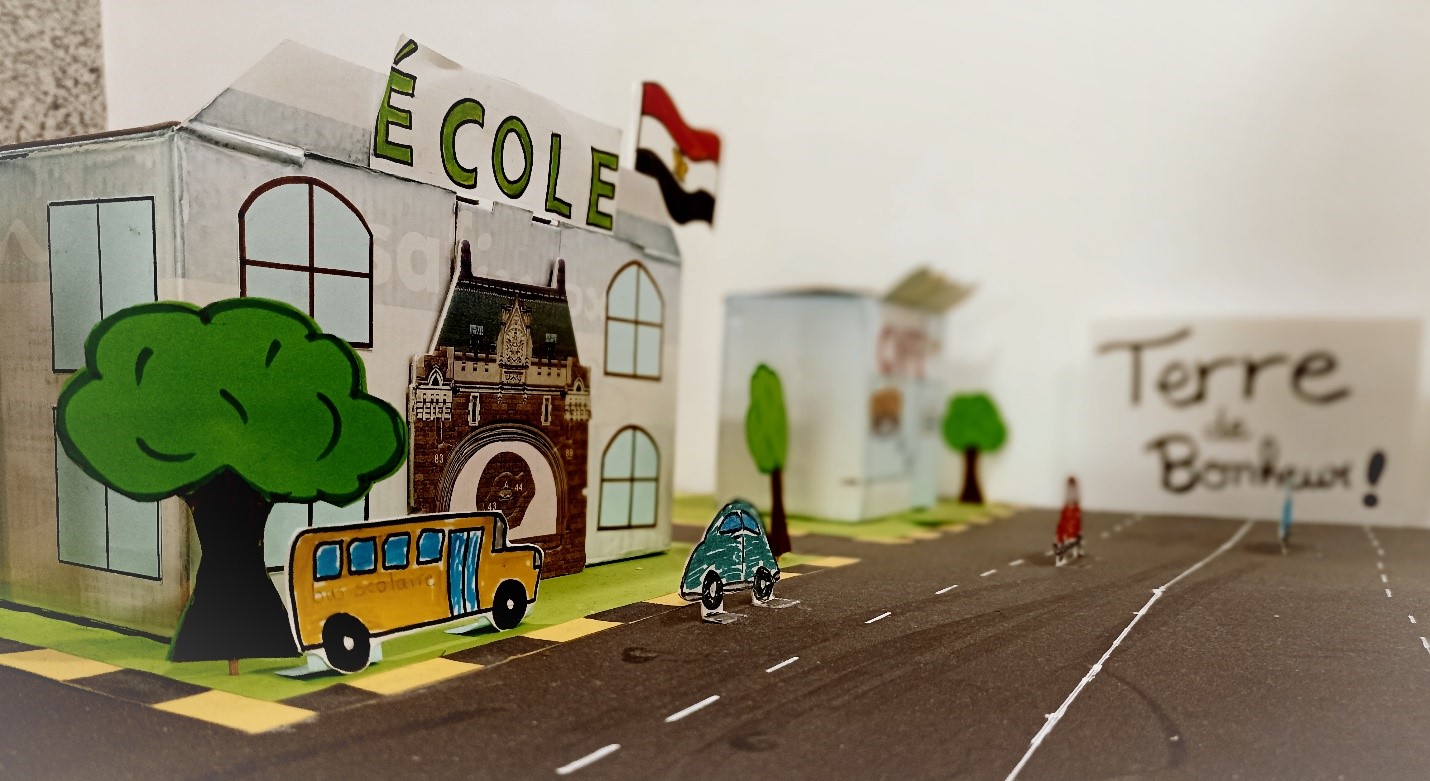
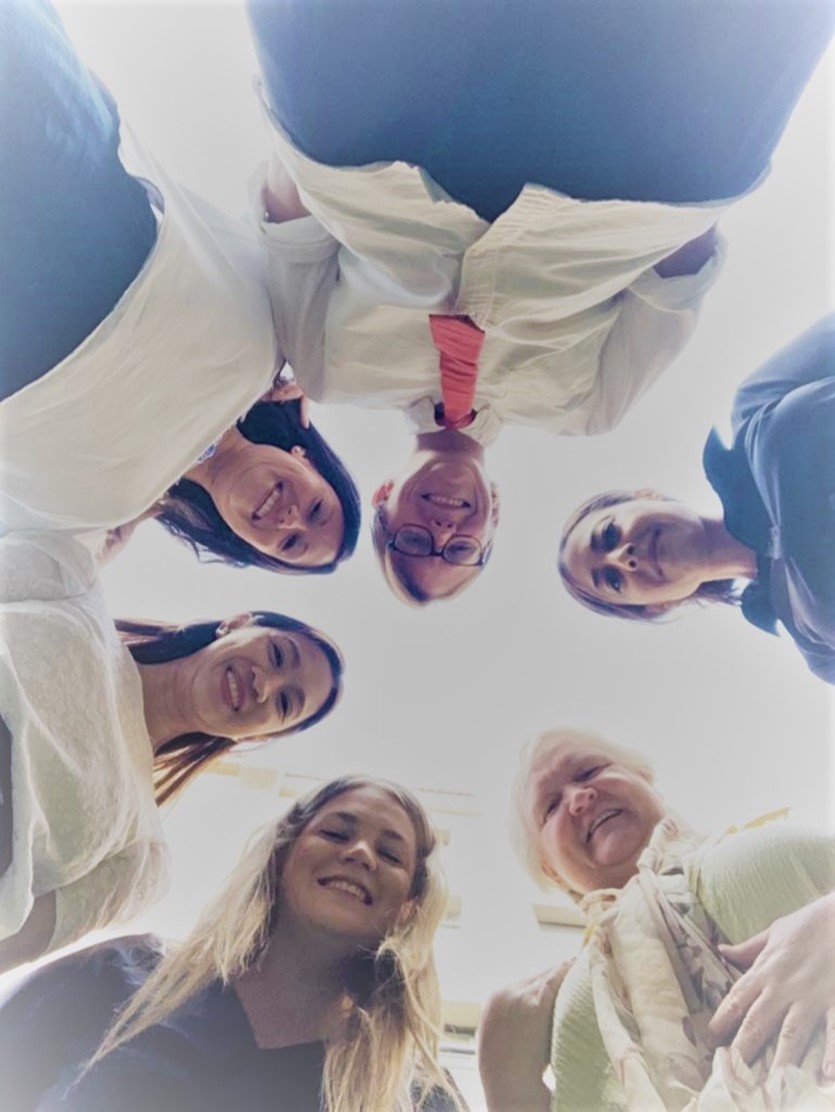
Dept. members (clockwise from top): Ms. Storm/ Ms. Loreen Abdel/Ms Rebecca Louis/ Ms. Katie Elizabeth/Ms Anne Tan/Ms. Sarah Phillips (HOD)
Curriculum Overview
Foundation Stage PSHE Topics
- Personal development
- Relationships
- Citizenship and school community
- Citizenship and local community
- Healthy living
- Lifestyles
Lower Primary Topics
- Research: Sharing planet earth, the right to learn, keeping healthy, the world of work.
- Analysis: Keeping safe, sport and leisure, water, food and farming.
- Reflection: Moving goods and people, reduce, reuse, recycle, families, the right to learn.
- Communication: Water, food and farming, people – young and old, growing up.
- Collaboration: Looking after planet earth, improving communication.
- Evaluation: Water, food and farming, looking after planet earth.
Upper Primary Topics
- Research: Water, food and farming, rich and poor, moving goods and people.
- Analysis: Using energy, keeping healthy.
- Reflection: Improving communication, reduce, reuse, recycle, living and working together.
- Communication: Sharing planet earth, keeping the peace.
- Collaboration: Sport and leisure, the world of work, keeping healthy.
- Evaluation: Values and beliefs, working with other countries, water, food and farming.
Lower Secondary Topics
- Research: Humans and other species, education for all, changing communities.
- Analysis: Belief systems, globalisation, sport and recreation.
- Reflection: Conflict and peace, human rights.
- Communication: Sustainability, tradition, culture and identity.
- Collaboration: Trade and aid.
- Evaluation: Employment, language and communication, migration, digital world.
Resources
IT Lab/Library/Kitchen
Set texts years 1 – 8Enrichment Opportunities & Events
Trips: COP 27 Sharm el Sheikh
Clubs: Climate Club, Model United Nations Debate Club, Cookery Club for Healthy Food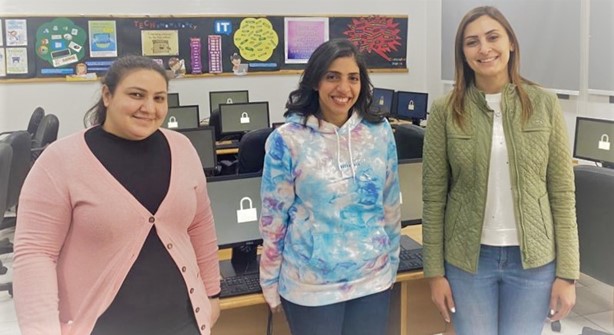
Dept. members
(Right to left) Ms. Sarah El Akkad / Ms. Lobna Ashraf / Ms. InjyCurriculum Overview
Lower Primary
Topics studied
- Types and components of computer systems
- Exploring documents (Word.doc)
- Exploring images
- Exploring spreadsheets
- Exploring databases
- Exploring presentation (power point)
- Exploring programming (scratch)
- Exploring the internet
- Exploring Email
- Exploring multimedia
Upper Primary
Topics studied
- Exploring programming (scratch)
- Exploring multimedia
- Exploring email (the web-based e-mail)
- Exploring the internet
- Spreadsheets for a purpose
- Website design for a purpose (HTML)
- Video animation for a purpose
Lower Secondary
Topics studied
- Networks for a purpose
- Website design for a purpose (HTML)
Resources
The school has three, fully equipped IT Labs as well as smartboards in every classroom
Websites: BBC.bitesize / Wordwall.com / crazy for computers / Edclub.com / Abcya.com / Khan academy
We follow the Cambridge syllabus and have all the associated textbooks and resourcesEnrichment Opportunities & Events
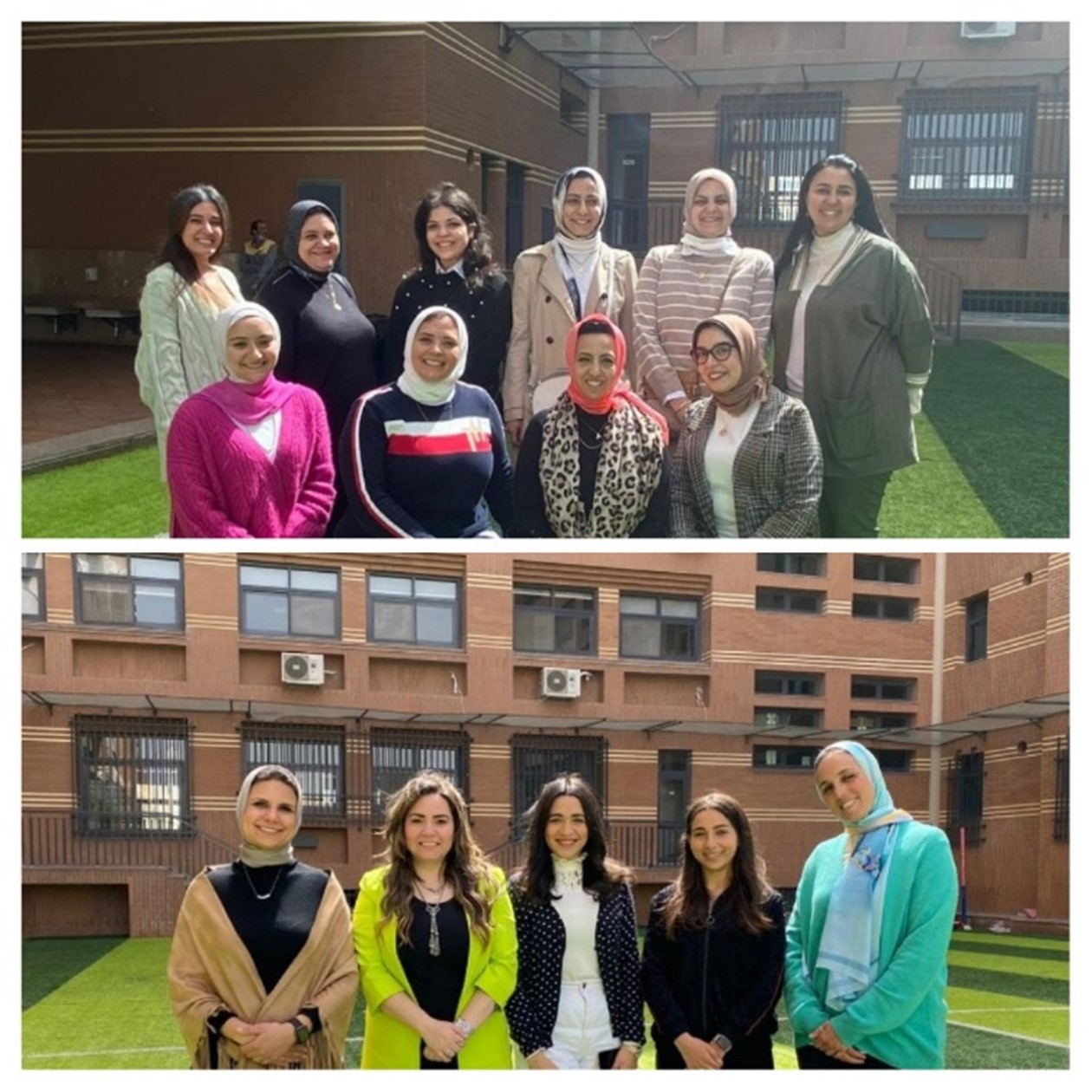
Dept. members
(right to left seated) Ms. Alaa Abdel Naser / Ms. Hania Shafik (HOD) / Ms. Sarah Sherif (HOD) / Ms. Nadine Eyad
(left to right standing) Ms.Malak Tarek / Ms. Amira Mohamed / Ms. Nouran Soffar / Ms. Rahma Abbas / Ms. Heba Samir / Ms. Dalia Hany
(right to left) Ms. Tasneem Tarek (HOD) / Ms. Mai Serg / Ms. Mai Ahmed / Ms. Injy Ragab / Ms. Menna SalemCurriculum Overview
Foundation Stage
Topics studied
- Recognising numerals & counting reliably till 100.
- Ordering numbers & counting forwards/backwards.
- Naming & learning characteristics of 2 & 3 dimension shapes.
- Using everyday objects to learn about weight, height, length, directions, positions & capacity.
- Using quantities & objects to learn addition, partitioning & subtraction.
- Learning about time (day & night, days, months)
- Recognising different Egyptian coins.
- Comparing quantities & numbers using less & more
Lower Primary
Topics studied
- Addition & subtraction
- Multiplication & division
- Fractions
- 2D & 3D shapes
- Money
- Weight & length
- Capacity
- Data handling & probability
- Time
Upper Primary
Topics studied
- Effective methods for adding/subtracting/multiplying
- dividing of whole numbers / decimals / fractions
- Percentages & averages
- Time 24hr format + time zones
- Special (squares/triangles
- 2D shapes/compound 2D shapes properties & sketching
- 3D shapes/compound 3D shapes properties & sketching
- Area & perimeter & transformations
- Multiples & factors
- Laws of Arithmetic
- Statistical cycle
- Probability
- Ratio & proportion
- Statistical cycle
- Positions & directions
- Angles & lines
Lower Secondary
Topics studied
Numbers:
- Types of numbers
- Tests of divisibility
- Integers operations
- Order of operations (BODMAS)
- Rounding
- Decimals operations
- Indices
- Standard form
- Fractions
- Ratio
- Percentages & simple interest
- Measure
- Time
- Limits of accuracy
- Planning to collect data
- Types of data
- Frequency tables
- Averages
- Representing data
- Collecting like terms
- Expanding & simplifying expressions
- Factorizing by HCF & grouping
- Constructing expressions & solving equations
- Solving equations
- Substitution
- Changing subject of the formula
- Inequalities
- Adding algebraic expressions
- Simultaneous equations
- Straight line equation
- Midpoint of a straight line
- Sequences & patterns
- Distance-time graph
- Angles & polygons
- Parallelism
- Quadrilateral properties
- Symmetry & rotational symmetry
- Pythagoras
- Area & perimeter
- The circle
- Drawing nets of 3D shapes
- Volume & total surface area
- Bearing
- Transformations
- Constructing triangles
- Congruency of triangles
Pre IGCSE
Topics studied
Numbers:
- The numbers system
- Fractions
- Order of operations (BODMAS)
- Rounding
- Metric units
- Ratio
- Standard form
- Percentage
- Simple & compound interest
- Limits of accuracy
- Money
- Time
- Sets & Venn diagrams
- Probability
- Planning to collect data
- Types of data
- Frequency tables
- Averages
- Representing data
- Indices
- Expanding & simplifying expressions
- Factorizing by HCF
- Substitution
- Solving equations
- Constructing expressions & solving equations
- Changing subject of the formula
- Simultaneous equations
- Straight line equation
- Quadratic & reciprocal graphs
- Sequences
- Conversion graphs
- Distance-time graph
- Angles & polygons
- Congruency & similarity
- Pythagoras & trigonometry
- Circles
- Symmetry & rotational symmetry
- Area & perimeter
- Nets of 3D shapes
- Volume & total surface area
- Bearing
- Constructing triangles
- Vectors
- Transformations
Resources
- Cambridge university press
- Collins
- Twinkle (web site)
- Online sheets
- TES
Enrichment Opportunities & Events
Trips
- Going to Hyper market to practice on weight & money
- School’s site for lengths and measurements
Events
Ours is a very ‘hands on’ department and we offer a number of activities and Mathematics related events over the year:
- Maths menia
- Prepare classes as a shop to practice local currency
- Maths Bee
- Math Mystery
- Maths Olympic games
- Fibonacci (cross curricular) Math, Science, English & Art
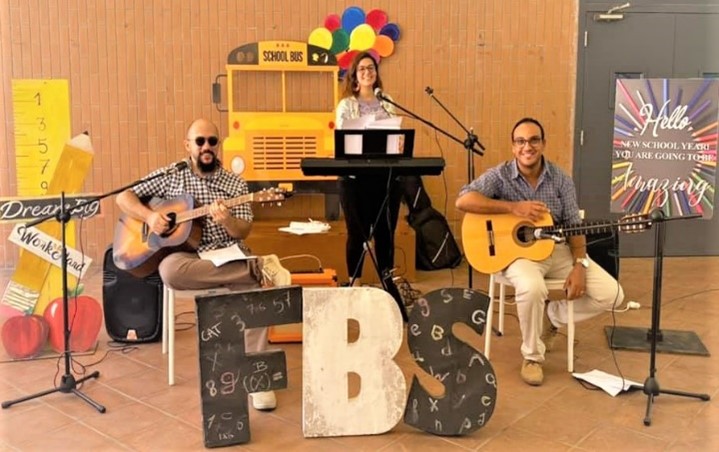
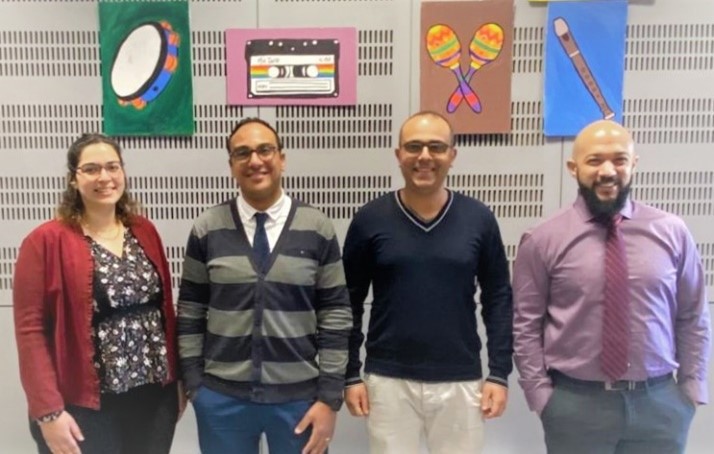
Dept. members
(right to left) Mr. Mostafa Hefnawy / Mr. Amir Michael / Mr. Amgad Youssef / Ms. Yasmine ZakiCurriculum Overview
Foundation Stage Topics
- The language of singing
- Introduction to instruments
- Introduction to musical notation
- Learning songs
- Stage skills performance
Lower Primary Topics
- Introduction to music theory
- Learning the piano
- Introduction to the drum set
- Stage skill performance
- Music games
Upper Primary Topics
- Music theory
- Beginner drums (beats, parks)
- Piano (fingering & sight reading, exercise)
- Singing with each instrument
- Musical games
Lower Secondary
Topics studied
Numbers:
- Types of numbers
- Tests of divisibility
- Integers operations
- Order of operations (BODMAS)
- Rounding
- Decimals operations
- Indices
- Standard form
- Fractions
- Ratio
- Percentages & simple interest
- Measure
- Time
- Limits of accuracy
- Planning to collect data
- Types of data
- Frequency tables
- Averages
- Representing data
- Collecting like terms
- Expanding & simplifying expressions
- Factorizing by HCF & grouping
- Constructing expressions & solving equations
- Solving equations
- Substitution
- Changing subject of the formula
- Inequalities
- Adding algebraic expressions
- Simultaneous equations
- Straight line equation
- Midpoint of a straight line
- Sequences & patterns
- Distance-time graph
- Angles & polygons
- Parallelism
- Quadrilateral properties
- Symmetry & rotational symmetry
- Pythagoras
- Area & perimeter
- The circle
- Drawing nets of 3D shapes
- Volume & total surface area
- Bearing
- Transformations
- Constructing triangles
- Congruency of triangles
Lower Secondary Topics
- Theory
- Drums
- Playing as a band
- The History of music
- Matery of solo performance
Resources
- The school has three fully equipped dedicated music rooms and uses the school theatre regularly for performance.
- ABRSM curriculum
- Cambridge curriculum
- Websites: world beat, music express & key music university of Dayton
Enrichment Opportunities & Events
- Our choir and musical performers are a regular and key part of school events including, but not limited to : welcome back, Halloween, Christmas, Mother’s day & graduation party
- Clubs: Our music awareness club opens up the world of music appreciation to our students, introducing them to artists and genres they may not be familiar with.
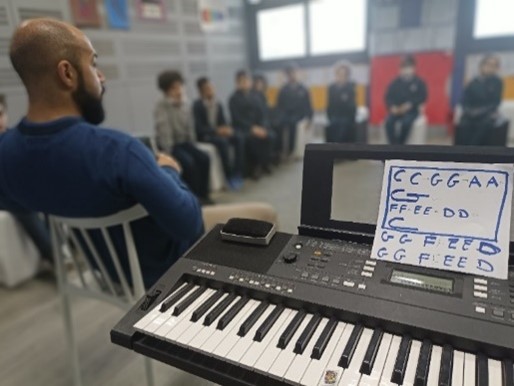
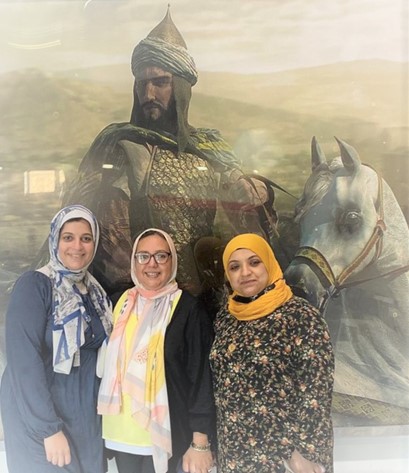
Dept. members
Ms. Doaa Hefny/Ms. Amany Khater(HOD)/Ms.Nadia Moustfa/Ms. Nancy SaeedCurriculum Overview
Upper Primary
Topics studied
الصف الرابع الابتدائي:
- معلومات عامة عن المادة وتأثيرها في جميع نواحي الحياة ويبداء في دراسة مفهوم التاريخ وبداية التاريخ الفرعوني وأهم الاماكن السياحية والتراثية في مصر
- الصف الخامس الابتدائي:
- تتناول الجغرافيا أهم الموارد الاقتصادية في مصر وكيفية استغلالها وأهم الانشطة الاقتصادية.
- التاريخ يقوم بدراسة اليوناني والروماني والحقية القبطية والتاريخ الاسلامي في مصر.
الصف السادس الابتدائي:
- تتناول الجغرافيا البيئات المصرية المصرية المتنوعة والانشطة الاقتصادية بكل بيئة وخصائصها السكانية. التاريخ يتناول التاريخ الحديث بداية من الدولة العثمانية وحتي التاريخ المعاصر وثورة 30 يونيو
Lower Secondary
Topics studied
الصف الأول الاعدادي:
- تتناول الجغرافيا الفضاء والكواكب والمجموعة الشمسية والاخطار البيئية والزلازل والبراكين واثار التلوث علي البيئة.
- التاريخ يتناول الحياة الفرعونية من الناحية السياسية والاجتماعية والدينية.
الصف الثاني الاعدادي:
- تتناول الجغرافيا جغرافيا الوطن العربي من حيث عدد الدول باسمائهم والتضاريس والانشطة الاقتصادية الهامة به وأهم الموارد الاقتصادية.
- التاريخ يتناول التاريخ الاسلامي من قبل ظهر الاسلام إلي نشأة الدولة الاسلامية واتساعها واهم العلماء الذين ظهروا في ذلك العصر.
الصف الثالث الاعدادي:
- فهو يتناول جغرافيا العالم قارات العالم وتضاريسها واهم الموارد الاقتصادية كما تتناول نماذج من الدول النامية والدول لدراستها والمقارنة بينهم.
- التاريخ يتناول بداية من الدولة العثمانية وتوسعتها واحتلالها لمصر إلي ثورة 25 يناير 2011 و30 يونيو.
IGCSE & A LEVEL
Topics studied
الصف الأول الثانوي:
- يقومون بدراسة جغرافيا مصر ولكن أكثر توسع، تضاريسها والموارد الاقتصادية المتاحة بها والانشطة الاقتصادسة بها.
- التاريخ فيدرس الطالب التاريخ الفرعوني وتاريخ حضارة العراق وفينيقيا ودولة البطالمة في مصر والرومان.
Resources
كتب وزارة التربية والتعليم
Enrichment Opportunities & Events
زيارة المتاحف الأثرية / احتفال انتصار حرب السادس من أكتوبر

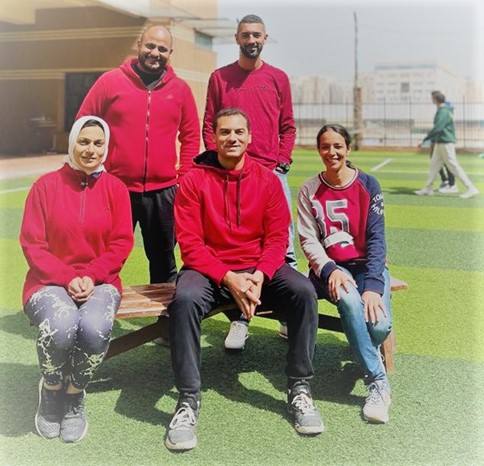
Dept. members
(right to left seated) Coach Nervine Mahmoud / Coach Ibrahim Salah / Coach Asmaa Morsy / (left to right standing) Coach Amir ElMoursy / Coach Omar Barakat/ Coach Amr AliCurriculum Overview
Foundation Stage
Topics studied:
- Moving confidently in a range of ways, safely negotiating space.
- Coordinating body movements to climb, walk in different directions, jump forward and gallop.
- Demonstrating coordinated movements in kicking, catching & throwing.
- Using hand-eye coordination & control to complete different tasks like, stringing beads, copying from the board & cutting.
- Demonstrating balance in using different gym equipment
Lower Primary
Topics studied:
- Controlling objects in games contest
- Healthy Bodies
- Play based games
- Developing creative and locomotor skills
Upper Primary
Topics studied:
- Use running, jumping, throwing and catching in isolation and combination
- Play competitive games, modified where appropriate and apply basic principles suitable for attacking and defending
- Develop flexibility, strength, techniques, control and balance
- In swimming use a range of stroke effectively
Lower Secondary
Topics studied:
- Use range of tactics and strategies to overcome opponents in direct competition through team and individual games
- Develop their technique and improve their performance in other competition sports.
- Take part in competitive sports and activities outside school through community links.
Resources
The school is very well provided for with three outdoor sport areas, two with artificial grass as well as its own, half Olympic size indoor pool and two gymnasium areas; in addition we also have regular access to the sporting facilities of Pharos University.
Enrichment Opportunities & Events
The P.E. department organizes several sports competitions for all age groups (basketball, football, volleyball)
Also there are friendly competitions between the American school.
The school has participated in different games competitions with other international schools for both primary & middle school.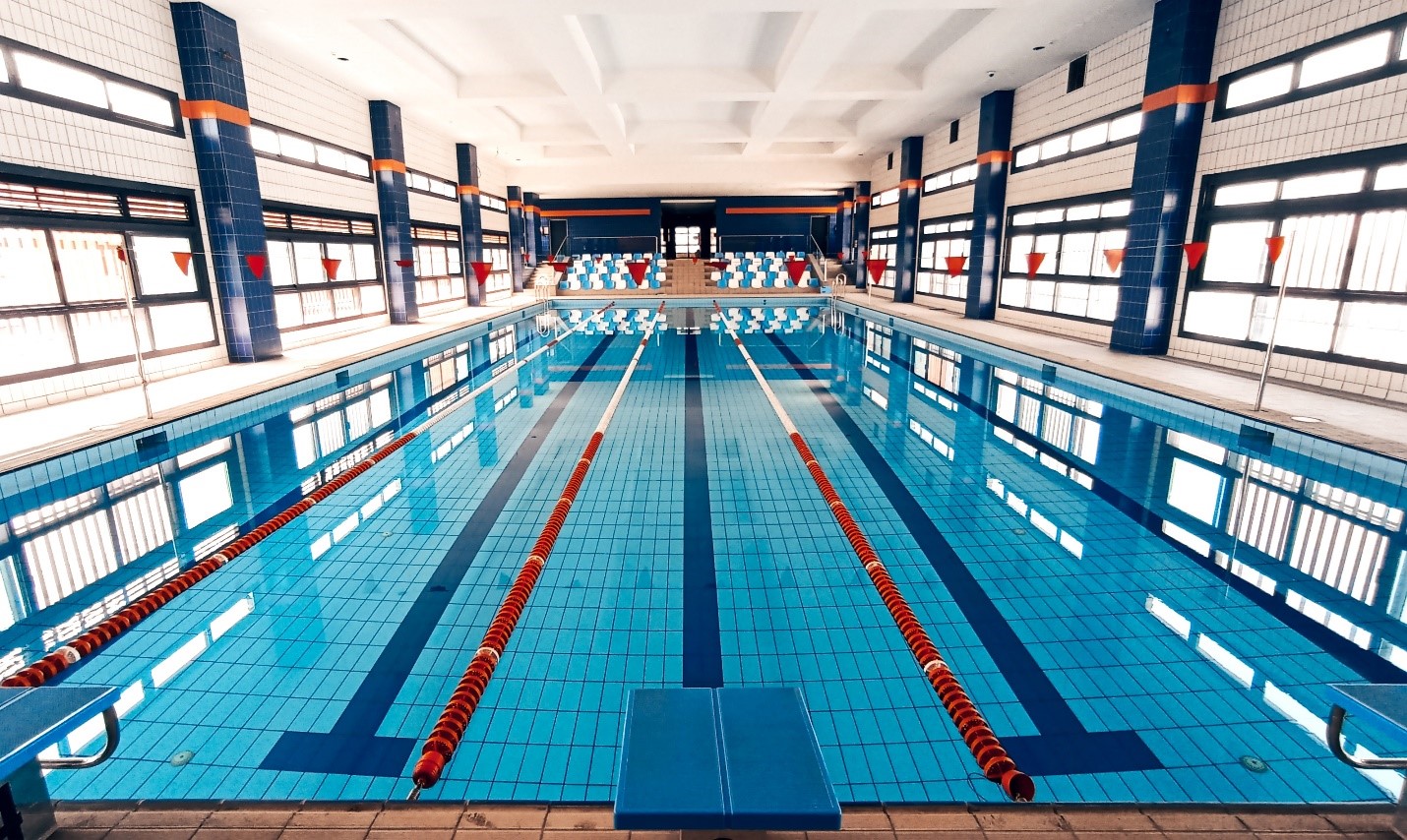
There is a single light of science, and to brighten it anywhere is to brighten it everywhere.
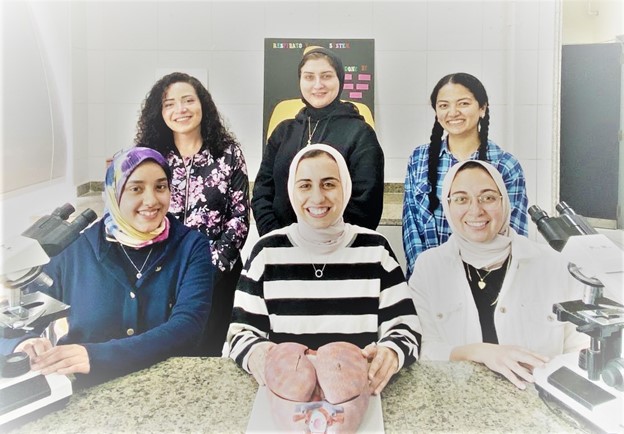
Dept. members
(right to left seated) Ms. Dina Adel / Ms. Farida Tarek / Ms. Fatima Mostafa
(left to right standing) Ms. Nancy El Hariry (HOD) / Ms. Marieanne / Ms. Malak Ibrahim / Ms. ShahdCurriculum Overview
Foundation Stage
Topics studied:
- Observing plant growth & weather changes
- Learning through experimenting about other concepts like melting, sinking & floating.
- Exploring what happens when mixing colours & different liquids
- Measuring & mixing ingredients in cooking.
- Exploring the world with five senses
- Understanding the concept of shadow, sounds & magnets
- Realising the importance of keeping healthy
Lower Primary
Topics studied:
- My body, your body
- What is it made of?
- Plants
- Science of tons
- Staying alive
- Journey to the international space ship
- Materials
- Living things
- Light
- Growing healthy
- Make a change
- Polar explorer
- Living things & plants
- Forces & magnetism
- States of m
- Animals
- Light & shadow
- Earth & Beyond
Upper Primary
Topics studied:
- Animal skeleton
- Life processes / echo’s stems
- Material prosperities / changes
- Electrician
- Energy & light
- Earth & Beyond
- Plants
- Materials
- Forces
- Animals
- Waves
- Planet Earth
- Human organs & systems
- Reversible / irreversible changes
- Food chains
- Conductors & insulators
- Caring for the environment
- Mass & weight
Lower Secondary
Topics studied:
- Material changes
- The earth
- Forces & motion
- Energy
- The earth & beyond
- Sound & Light
- Magnetism
- Electricity
- Plants
- Humans as organisms
- Cells & organisms
- Living thing in their environment
- Variation & classification
- States of matter
- Material properties
Resources
The school has five fully equipped laboratories and all the resources required for the Cambridge syllabus, including all the latest textbooks and workbooks.
Enrichment Opportunities & Events
The school Science Fair is an annual event where students can showcase their talent and interest in science.
